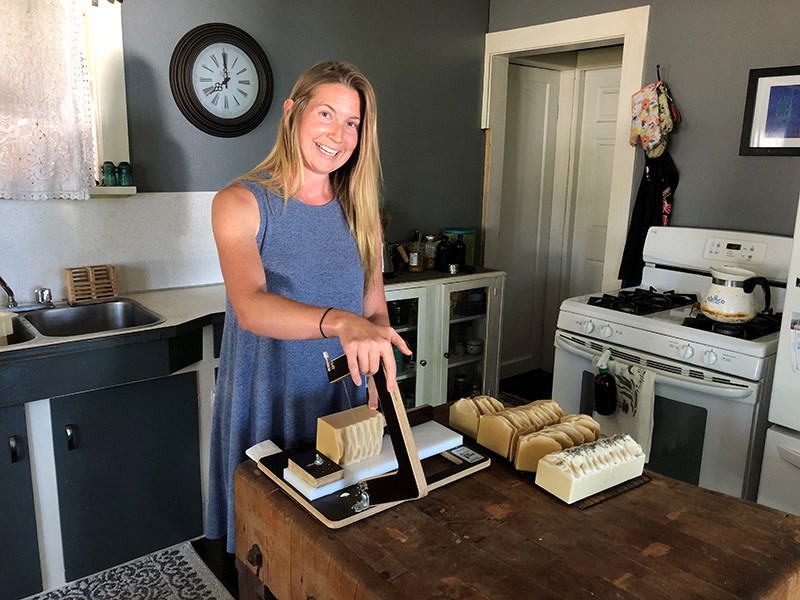In North of Town, Grant Lawrence profiles the lives and livelihoods of those who have chosen life at or beyond the end of Highway 101.
Soap. It’s a simple word for a simple product. And yet, it may well be the word of the year, up there with “unprecedented” or “pivot.”
From day one of the pandemic, we’ve been told to wash our hands with soap and water as much as possible. But what is in that soap that sits beside your sink? With our hands feeling like sandpaper, many of us are paying closer attention to the kinds of soap we use.
Earlier this year, when I was visiting the Farmer’s Gate store south of Lund, I noticed what looked like a delicious and perfectly sliced lemon loaf sitting in a basket on the counter. Upon closer inspection, I realized it was in fact not food, but the most aesthetically pleasing soap I had ever seen. It looked and smelled so amazing that, even after knowing it was soap, my wife still had to stop me from eating it.
That was the moment I discovered the Lund Soap Company: an artisan, small batch, natural, “cold process” soap, handmade in Lund by owner/operator Roberta Biggs. After using the soap at our cabin, which rapidly improved the smell of our entire family, I had to know more.
Biggs is a coastal kid through and through: she was born on Salt Spring Island, raised in the Comox Valley, and has been a Lundie since 2007. She’s always had strong family connections to the area: her grandmother was Irene Hicks, since passed, who had a cabin on Savary Island, and her aunt is Judy Hicks, an oyster farmer in Okeover Inlet.
Since arriving in Lund, Biggs has worked at the General Store, the Boardwalk Restaurant, and the prawn plant, before becoming a care aide home support worker for Vancouver Coastal Health. Biggs currently balances her day job with her burgeoning soap business.
“I’ve always been into old timey things and preserving, making my own jams and jellies, and so making my own soap seemed like a natural next step,” said Biggs. “Kathy Thomas, the previous longtime manager at the Lund General Store, was really encouraging. She started selling my soaps at the store in 2018 and that’s how this all started.”
Biggs’ workshop is set up in a historic, century-old little house nestled on the hill above Lund that looks out onto Hernando Island. The house is owned by her boyfriend, Thor Larson, a fisher whose family stretches back to Lund’s first wave of 1880s European settlers.
Biggs makes the soap in the kitchen of the home with a view to die for. And while Biggs is typically West Coast-modest, she eventually admitted pride for her special product.
“My soap is very rustic and organic – no two bars are the same,” she said. “They’re all handmade and hand cut right here in the kitchen.”
Not surprisingly, Biggs tries to use as many local ingredients in her soaps as possible depending on the season, including goat’s milk from Pat Hanson’s farm, blackberries, salmonberries, seaweed powder, and calendula, a herbal flower.
I asked Biggs if the delectable “loaf look” was by design.
“It is!” she laughed. “The top of the bars have a kind of mountaintop shape because when I’m pouring it into the mould, I try to put as much in as possible so it kind of mounds up in the middle. Then I smooth out the tops to make a wave pattern.”
Her basic ingredients are water, oil (olive, grapeseed, coconut, castor, sweet almond or shea butter, depending on the bar) and liquified lye. That’s put into a blender for six minutes, then the special ingredients are added, then it’s poured into the moulds.
“It thickens very quickly at this point,” explained Biggs, “so time is of the essence. I have about five minutes before it turns from a liquid into a solid, so if a flower or lavender is going on top, I have to set it before it hardens.”
Once the loaf has thoroughly hardened, Biggs slices it with a wire soap cutter, an almost hypnotic, zen-like process that produces an extremely satisfying “ping” upon completion. The machine is a curious cross between a cheese slicer and a guitar. An actual guitar string slices the soap, which is tightened and loosened with a tuning peg, hence the pinging note.
Then comes the wait.
“After the soap is sliced up, I set it to cure for six to eight weeks before I sell it,” revealed Biggs.
Six to eight weeks?
“Correct,” she added. “The soap needs to cure, harden and lose water weight so the bars will last when they’re used.”
The long cure is known as “cold process.” Despite the epic turnaround time, Biggs is extremely busy, and timing is everything. Usually, the split between her day job and her soap is about 50/50. Around the holidays, it’s more like 80 per cent soap.
Her top seller is the patchouli-scented Crusty Lundie.
“This past summer I couldn’t make it fast enough,” said Biggs. “It was always the first one to sell out. Goats Milk Lemongrass is also very popular.”
Other bars include the Flower Child, Camp Coffee and Pine Tar, to name a few, and there’s also a line of shampoo and conditioner bars.
“This year things have really taken off, and the holidays are keeping me on my toes,” said Biggs.
You could say she’s cleaning up.
Grant Lawrence is an award-winning author, columnist and radio personality who considers Powell River and Desolation Sound his second home. An audio version of this story originally aired on CBC Radio.



